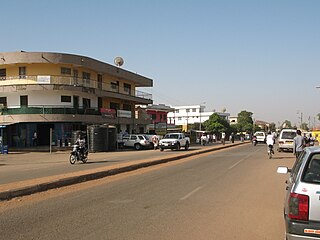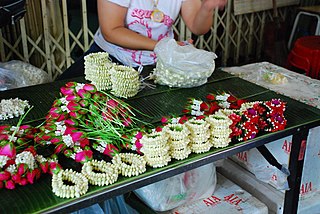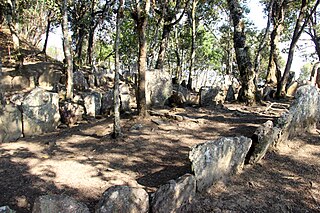This article needs additional citations for verification .(December 2018) |
The Mim Kut is a festival of the Zo People, of India and Burma. It is usually celebrated during the months of August and September, job's tears and millets. [1]
This article needs additional citations for verification .(December 2018) |
The Mim Kut is a festival of the Zo People, of India and Burma. It is usually celebrated during the months of August and September, job's tears and millets. [1]
Mim Kut is regarded as the oldest festival of the Zo People, it was a ceremony organized for the dead. [2] Feasting is a part of it but there is hardly any fun and gaiety in it. Mim means Job's tears (Coix lacryma-jobi), also known as adlay or adlay millet which was introduced much later). It was held in memory of the deceased. [3]

Millets are a highly varied group of small-seeded grasses, widely grown around the world as cereal crops or grains for fodder and human food. Most species generally referred to as millets belong to the tribe Paniceae.

Mizoram is a landlocked state in northeast India, with Aizawl as its seat of government and largest city. Within India's northeast region, it is the southernmost state, sharing borders with three of the Seven Sister States, namely Tripura, Assam and Manipur, and also shares a 722-kilometre (449 mi) border with the neighbouring countries of Bangladesh and Myanmar. The state spans over an area of approximately 21,087 square kilometres, of which approximately 91% is forested. With an estimated population of 1.25 million in 2023, it is the second least populous state in the country.

The All India Majlis-e-Ittehadul Muslimeen is an Indian political party based primarily in the old city of Hyderabad, It is also a significant political party in the Indian States of Telangana, Maharashtra, Uttar Pradesh, Tamil Nadu and Bihar.

Wa is the capital town of Wa Municipal and Upper West Region of northern Ghana. It forms part of the eleven Municipalities and Districts that make-up the Upper West Region. It’s Municipal Assembly is one of the 261 Metropolitan, Municipal and District Assemblies (MMDAs) in Ghana.

Job's tears, also known as adlay or adlay millet, is a tall grain-bearing perennial tropical plant of the family Poaceae. It is native to Southeast Asia and introduced to Northern China and India in remote antiquity, and elsewhere cultivated in gardens as an annual. It has been naturalized in the southern United States and the New World tropics. In its native environment it is grown at higher elevation areas where rice and corn do not grow well. Job's tears are also commonly sold as Chinese pearl barley, though true barley belongs to a completely different genus.

Asaduddin Salahuddin Owaisi is an Indian politician, who is the President of the All India Majlis-e-Ittehadul Muslimeen (AIMIM). He is a 4 time Member of Parliament representing the Hyderabad constituency in Lok Sabha, the lower house of the Indian Parliament. For years, he has been regularly listed by Royal Islamic Strategic Studies Centre (RISSC), among the 500 Most Influential Muslims of the world.

The Marathi people or Marathis are an Indo-Aryan ethnolinguistic group who are native to Maharashtra in western India. They natively speak Marathi, an Indo-Aryan language. Maharashtra was formed as a Marathi-speaking state of India on May 1, 1960, as part of a nationwide linguistic reorganisation of the Indian states. The term "Maratha" is generally used by historians to refer to all Marathi-speaking peoples, irrespective of their caste; However, it may refer to a Maharashtrian caste known as the Maratha.
Guite is the progenitor clan of Zomi people, also called Chin in Myanmar, Mizo, or Paite, or even Kuki in India. According to Zam, Nigui Guite is the elder brother of the ancestral fathers of the Thadou people, namely Thangpi, Sattawng, and Neirawng. This genealogy was recently inscribed on the tribal memorial stone at Bungmual, Lamka in the presence of each family-head of the three major clans, Doungel, Kipgen, and Haokip, on August 7, 2011. Some historians, like Shakespeare, assumed Lamlei was the Nigui Guite himself but the Guites themselves recounted Tuahciang, the father of Lamlei, as the son of Nigui Guite instead, in their social-religious rites. Regarding Guite as the born son of Songthu and his sister, Nemnep, it was the practice of ancient royalty to issue royal heir and also to keep their bloodline pure instead. Depending on local pronunciation, the clan was also called by different names such as Nguite or Vuite, Gwite, Nwite, Paihte by the Lushei. In accord with the claim of their solar origin, the Guite clan has been called nampi, meaning noble or major or even dominant people, of the region in local dialect in the past.

Phuang malai or malai are a Thai form of floral garland. They are often given as offerings or kept for good luck.

Lawngtlai is a town located in the southern part of Mizoram, India. It serves as the administrative headquarters of the Lawngtlai district and is home to the Pawi people, also known as the Hakha Chin people in Myanmar. Lawngtlai celebrates a variety of indigenous festivals, such as the Hlukhla Kut, similar to that of Chapchar Kut.

Lammual Stadium is a football stadium located in Aizawl, Mizoram, India. It is used mainly for football matches. It was one of the venues for the Northeast Games 2012. The stadium serves as the venue for Mizoram Premier League matches.

Hmuifang is a tourist spot about 50 km from Aizawl, Mizoram, India. With an elevation of 1,619 metres, the mountain is covered with forest reserves since all the Mizo Chief's time.

The Chapchar Kut is a festival of Mizoram, India.
Here is a list of glossary of Culture of India in alphabetical order:

The Darlong people are an Kuki ethnic tribe living in the state of Tripura, India. The Darlong call themselves ‘hriam’ or ‘manmasi’. They constitute less than one percent of the population of Tripura.

Bissau-Guinean cuisine is the food culture of Guinea-Bissau, a nation on Africa's west coast along the Atlantic Ocean. Rice is a staple in the diet of residents near the coast and millet a staple in the interior. Much of the rice is imported and food insecurity is a problem in large part due to coups, corruption and inflation. Cashews are grown for export. Coconut, palm nut, and olives are also grown.

Mizoram is a state in the northeast of India. Mizoram is considered by many as a beautiful place due to its landscape and pleasant climate. There have been many attempts to increase revenue through tourism but many potential tourists find the lack of amenities to be a hurdle. However, the State continues to promote itself and many projects have been initiated. The tourism ministry continues to maintain or upgrade its tourist lodges throughout the state. Foreign tourists are required to obtain an 'inner line permit' under the special permit before visiting. The permit can be obtained from Indian missions abroad for a limited number of days or direct from Mizoram Government authorities within India. The state is rich in bird diversity, which has the potentiality to make it a major birding destination. Mizoram is a stronghold for Mrs. Hume's pheasant. There is also a rare record of the wild water buffalo from the state. There are several past records of the Sumatran rhinoceros from Mizoram, then Lushai Hills. The small population of wild elephants can be seen in Ngengpui and Dampa Sanctuaries.
Xinglonggou is a Neolithic through Bronze Age archaeological site complex consisting of three separate sites. The sites are located on a loess slope above the left bank of the Mangniu River north of the Qilaotu Mountains in Aohan Banner, Inner Mongolia, China. Xinglonggou is one of the most important sites of the early Neolithic Xinglongwa culture and provides evidence for the development of millet cultivation. The millet assemblage at Xinglonggou consists primarily of broomcorn millet. Xinglonggou is one of the few, early Neolithic sites in China for which systematic flotation has been performed.
Pangasi, also known as pangase or gasi, are various traditional Filipino rice wines from the Visayas Islands and Mindanao. They could also be made from other native cereals like millet and job's tears. Pangasi and other native Filipino alcoholic beverages made from cereal grains were collectively referred to by the Spanish as pitarrillos.